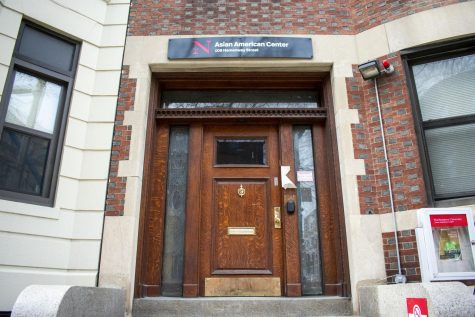A history of struggles for the Asian American Center
March 27, 2021
These recent events are not the first time that the Asian American community on campus has felt ignored by the university, Deng said. For them — as outlined in the student letter — this is another instance in a pattern of negligence.
The Asian American Center, or AAC, is one of the main umbrella organizations that houses AAPI student organizations, including PAAC, and acts as a safe haven for many students. Yet for years, they have lacked physical and financial support from the university, Blaufox said.
Between 2014 and 2015, the university cut the AAC’s yearly budget by more than $10,000, said Aaron Parayno, a former staff member of the AAC. He does not recall the specific amount, but he confirmed that this portion of the budget was being used for funding student programs at the time. He said the budget cut, in turn, negatively impacted the quality and number of events hosted by the center.

For every year after, Parayno said the AAC received the reduced budget and AAC staff had to request the university for the money that was taken away. Every year he was a full-time staff member, which was until 2019, he said the request was granted, but the money was not guaranteed for the next year.
NU media relations has not immediately responded to The News’ inquiries regarding the budget cuts.
Deng feels that the budget should have increased given the growing Asian student population. In 2008, 8.2% of NU’s undergraduate population identified as Asian; today, the community has more than doubled, making up 16.8% of the undergraduate student body.
Along with many other students, Christopher Park, a fourth-year biochemistry major and AASIA senior mentor, believes the AAC is understaffed with currently only one director and one assistant director. In the last few years, there have only been three AAC full-time staff members at most.
“It’s hard running a center with two or three people. You can only run and air so many programs,” Park said.
He believes that more funding and staffing for all cultural centers on campus would allow for more meaningful programs for students to embrace their heritage and history. He feels this is key for making the campus a more inclusive environment.
Members of Asian culture organizations, including Blaufox, Deng and Park, also feel there is simply not enough space at the AAC for them to gather. The center has a handful of small rooms and two areas for storage, which are all shared among at least 11 AAPI organizations.
Additional anonymous testimonials in the open letter also discuss the limited amount of space, as well as limited funding for cultural organizations.
Blaufox said she spoke on the phone directly with many of those who submitted testimonials, spanning nearly a decade’s worth of on-campus grievances and issues for the AAPI community.
“The first thing I felt was so incredibly upset,” Blaufox said, “not only that Northeastern has been like this for a long time and is continuing to be this way, but truly upset that my community has had to deal with this for so long.”
